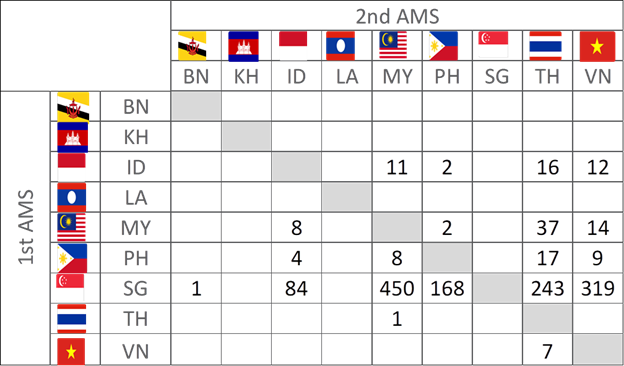Navigating ASEAN Patents: Tips for Fast-Tracking Your Patent Protection Cost-Effectively
13 Aug 2024
The Association of Southeast Asian Nations, commonly abbreviated as ASEAN, comprises ten member states: Singapore, Malaysia, Indonesia, Thailand, the Philippines, Vietnam, Brunei, Laos, Cambodia, and Myanmar. ASEAN has a total population of more than 670 million. With swift urbanization and a rising standard of living, it has become a high-growth market for companies seeking investment or expansion opportunities. ASEAN manufacturing investment is also booming. The ASEAN region has recently become the preferred destination for manufacturing investment by OECD (Organization for Economic Co-operation and Development) investors. Given the value of this emerging market, companies should include patent protection in ASEAN as a key component of their expansion plans.
However, patent prosecution usually takes a long time in ASEAN member states. Most ASEAN member states are not equipped with examiners with sufficient technical and legal knowledge or experience in patent prosecution. Currently, only the Singapore, Vietnam, and Philippines patent offices have the capability to conduct independent patent searches and examinations. The other ASEAN patent offices have to wait for a patent to be granted by a major jurisdiction, such as the USPTO, EPO, or JPO (provided the applicant has filed a corresponding patent application in one of these countries), and then invite the applicant to conform the claims of the ASEAN patent application to the claims as granted in the major jurisdiction. Hence, the ASEAN patent will only be granted years after filing, jeopardizing the patent applicants’ ability to utilize the patents while they are under examination. Therefore, proactive steps should be taken to accelerate patent prosecution in ASEAN. The following are three possible ways to achieve this purpose.
Patent Prosecution Highway (PPH) Programs Between ASEAN Countries and Non-ASEAN Major Jurisdictions
Singapore is the only ASEAN country that is a member of the Global Patent Prosecution Highway (GPPH) program. The rest of the ASEAN countries only participate in bilateral PPH programs or bilateral patent examination acceleration programs. Specifically, the following bilateral acceleration programs are available:
-
Singapore: PPH with BR, CN, MX, EPO (European Patent Office), SA
-
Malaysia: PPH with CN, EPO, JP, KR, US
-
Indonesia and Vietnam: PPH with JP, KR
-
The Philippines: PPH with US, JP, KR, EPO
-
Thailand and Brunei: PPH with JP
-
Cambodia: accelerated examination based on JP, KR, US, validation based on CN, EPO
-
Laos: accelerated examination based on CN, JP, KR
Taking advantage of these acceleration programs can shorten patent prosecution in ASEAN countries by at least 1-2 years on average. It is to be noted, however, that for most ASEAN countries, the request for acceleration must be submitted before the respective ASEAN examination deadline is due. If the corresponding patent has yet to be granted in US, EPO, JP, KR, or CN, etc., by the ASEAN examination deadline, it is usually not possible to request acceleration in ASEAN countries.
The ASEAN Patent Examination Co-operation (ASPEC) Program
ASPEC is a regional patent work-sharing program among nine participating member states (as of date, Myanmar is not participating in the ASPEC program). Under this program, the first ASEAN member state issues the Examination Report, and the second ASEAN member state submits the request for accelerated examination based on the Examination Report issued by the first AMS. Unlike the PPH programs, The ASPEC request may be filed any time before the final decision of grant or refusal of the ASEAN patent applications.
ASPEC significantly accelerated patent prosecution in ASEAN member states, with the average pendency rate to first office action after ASPEC request being 9.31 months. As of July 2023, 1,436 ASPEC requests have been submitted. The overall allowance rate of patent applications with ASPEC request is 98.32%.
.png.aspx?width=500&height=293)
The table above shows the distribution of the 1,436 ASPEC requests based on the 1st ASEAN Member State (AMS) and the 2nd AMS. Singapore served as the 1st AMS for more than 90% of the cases, followed by Malaysia, Indonesia, the Philippines, Vietnam, and Thailand.
Re-registration of Singapore Granted Patent
Cambodia and Laos allow patent grants based on the re-registration of a granted Singapore patent. The advantage is that the patent applications in Cambodia and Laos only need to be filed after the Singapore patent is granted. This creates certainty and defers patent costs.
Conclusion
By leveraging programs such as the PPH and the ASPEC programs, as well as taking advantage of re-registration options in countries like Cambodia and Laos, companies can significantly expedite the patent prosecution process in ASEAN countries. These strategies not only save time and costs but also ensure that companies can swiftly secure and utilize their patents in the rapidly growing ASEAN market.
- Written by Melanie Yun, Patent Agent at Drew & Napier LLC